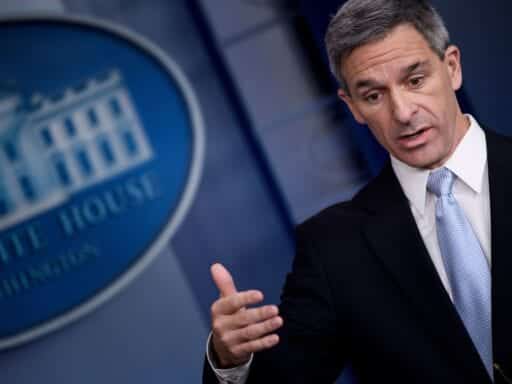He’s the public face of Trump’s hardline immigration policies.
A federal judge in Washington, DC, ruled on Sunday that Ken Cuccinelli, now acting deputy homeland security secretary, wasn’t lawfully appointed to his previous position at US Citizenship and Immigration Services.
The ruling represents the culmination of a months-long legal fight over Trump’s decision to sidestep the Senate confirmation process to install Cuccinelli first as the acting director of USCIS, a position he held from June through November 2019, and then as the second-most senior official at DHS.
But it likely doesn’t mean that Cuccinelli, who has become the public face of President Donald Trump’s hardline immigration policy, will lose his job — merely that two asylum directives he rolled out at USCIS must be set aside.
A group of asylum seekers and organizations that offer them legal aid who have been affected by those directives had brought the lawsuit.
One directive reduced the amount of time that asylum seekers can consult with attorneys before their preliminary interviews from 48 hours at minimum to only a single calendar day following their arrival at a detention center. The other prevented asylum officers from granting migrants extensions on time to prepare for those interviews except in the “most extraordinary of circumstances.”
“[T]he Court concludes that Cuccinelli was not lawfully appointed to serve as [USCIS] acting Director and that, as a result, he lacked authority to issue the reduced-time-to-consult and prohibition-on-extensions directives,” US District Judge Randolph Moss wrote in the decision.
The ruling doesn’t say anything about Cuccinelli’s appointment at DHS, but it could invite additional legal challenges. On Fox News on Monday, Cuccinelli said that the ruling was an “outlier” and that USCIS will reissue the policies that he presided over as a “precautionary measure.”
The Department of Justice did not immediately respond to requests for comment on whether it will appeal the ruling.
Cuccinelli has become the de facto spokesperson for Trump’s immigration policy, even when it technically goes beyond his job description. Most infamously, he proposed an amendment to Emma Lazarus’s famous poem on the Statue of Liberty in an interview with NPR: “Give me your tired and your poor who can stand on their own two feet.” Taking cues from Trump, he also tweets prolifically, lambasting the “radical left” and reporters he accuses of misquoting him.
Why Cuccinelli’s appointment was contested
The Constitution mandates that the president has to seek the “advice and consent of the Senate” through a confirmation process before installing an official as the head of an executive agency like USCIS and DHS. But Trump has largely avoided that process by instead appointing temporary acting officials, which he says he prefers because it gives him more flexibility.
The Federal Vacancies Reform Act of 1998 (FVRA) establishes requirements for an official to be able to serve in an acting capacity. The law allows the president to fill a vacancy temporarily with anyone who is the “first assistant” to the open position, holds a Senate-confirmed position in the administration, or has served in the same agency as the open position for a minimum of 90 days prior to the opening of the vacancy, regardless of whether they have been confirmed by the Senate.
Prior to his appointment at USCIS, Cuccinelli hadn’t fulfilled any of those requirements. And getting Cuccinelli confirmed likely would have been a difficult task in the Republican-led Senate, where he has made powerful enemies.
Senate Majority Leader Mitch McConnell told reporters in April 2019 that he had expressed his “lack of enthusiasm” about Cuccinelli to the president. (Cuccinelli previously used to lead the Senate Conservatives Fund, a group that fundraised to unseat incumbent Republican senators, including McConnell.)
Administration officials found what they thought was a workaround: they appointed Cuccinelli to a newly created position called the “principal deputy director of USCIS.” They then rearranged the line of succession at the agency such that the principal deputy director became the most senior successor to the vacant USCIS director position, allowing Trump to then promote Cuccinelli to the acting director position in June 2019 in compliance with FVRA requirements, the government has argued.
But the court wasn’t satisfied by that scheme on Sunday.
“[Cuccinelli] never did and never will serve in a subordinate role—that is, as an ‘assistant’—to any other USCIS official,” the decision states. “For this reason alone, [the government’s] contention that his appointment satisfies the FVRA cannot be squared with the text, structure, or purpose of the FVRA.”
Cuccinelli’s appointment at DHS, which he assumed in November, has also been controversial. After former acting DHS Secretary Kevin McAleenan resigned in October, Trump had reportedly wanted to tap Cuccinelli as his successor, a move that would have given the president an acting secretary who appears to agree with him on both style and substance.
But Trump’s legal advisers reportedly told him that appointing Cuccinelli as acting DHS secretary would likely run afoul of the FVRA. Cuccinelli didn’t fulfill any of the requirements, legal experts have argued: He wasn’t second in command at DHS, he hadn’t been confirmed by the Senate in his role at USCIS, and he was not a senior DHS employee for the 90 days before former DHS Secretary Kirstjen Nielsen, the last person to hold the position on a permanent basis, stepped down on April 10.
After weeks of deliberation and confusion, Trump eventually decided to pick Chad Wolf, a former top aide to DHS Secretary Kirstjen Nielsen, and appointed Cuccinelli to the second-most senior position in the agency instead.
Author: Nicole Narea
Read More



